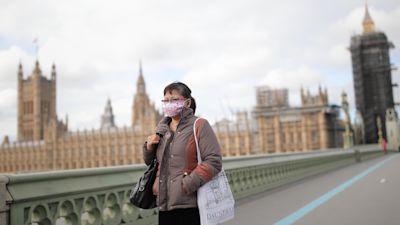Covid R rate 'above 2 in London' with infections spreading fastest in the South

The second wave of coronavirus in England has reached a “critical stage” with a new report suggesting that, on average, every infected person in London is passing on the virus to nearly three other people - the highest estimated R rate in England.
The Imperial College London study showed infections are doubling every nine days, with a national reproduction number (R) - the spread of infection - estimated at 1.56, compared to 1.16 in the previous round.
The study used data and swab results from 86,000 people between October 16-25, and estimates there are around 96,000 new infections per day.
But the fastest growth rates are now in the South, with the R number in London as high as 2.86.
The experts behind the data called for tougher restrictions to be implemented sooner rather than later as the current measures are “not sufficient”.
Their warning comes after the capital moved from Tier 1 to Tier 2 - High Alert - banning households mixing indoors and Londoners have been told to avoid public transport where possible.
Could London move into Tier 3? ITV News London Correspondent Simon Harris reports
According to the study, the overall prevalence of infection in the community in England was 1.28% – or 128 people per 10,000, up from 60 per 10,000 in the previous round which took place between September 18 and October 5.
The experts warn: “The co-occurrence of high prevalence and rapid growth means that the second wave of the epidemic in England has now reached a critical stage.
“Whether via regional or national measures, it is now time-critical to control the virus and turn R below one if further hospital admissions and deaths from Covid-19 are to be avoided.”
According to the study, prevalence increased across all age groups with the greatest rise in those aged 55-64 at 1.20%, up from 0.37%.
Professor Paul Elliott, director of the programme at Imperial from the School of Public Health, said: “I think we were disappointed to see that actually we were still in this rapid growth phase – except, as we say, in the North East where there does seem to have been a turn down, but it’s still growing.”
He added: “It’s more critical, because it’s gone up more and it’s continuing to go up.
Steven Riley, professor of infectious disease dynamics, Imperial College London, said: “Our data show that there’s absolutely no reason to expect that exponential rise to change to the next few weeks, regardless of what we do, because we’re measuring infections occurring in the community.”
He said it was not up to him to say what further measures may be introduced, but added: “If we are going to consider at some point over the winter that we may have to do something much more stringent, then it becomes a question of time.
“ I think these results do argue for something sooner rather than later.”
Prof Riley said: “There has to be a change. The rate of growth that we’re seeing and in these data is really quite rapid, so one way or another there has to be a change before Christmas.
“We’ve fairly reliably measured a slight decrease in R in our interim round five, now we have measured a slight increase in R, and the slight increase in R means that current measures are not sufficient.”
The React study which was commissioned by DHSC and carried out by a world-class team of scientists, clinicians and researchers at Imperial College London, Imperial College Healthcare NHS Trust and Ipsos Mori.
The data is released as a pre-print and has not been peer-reviewed.